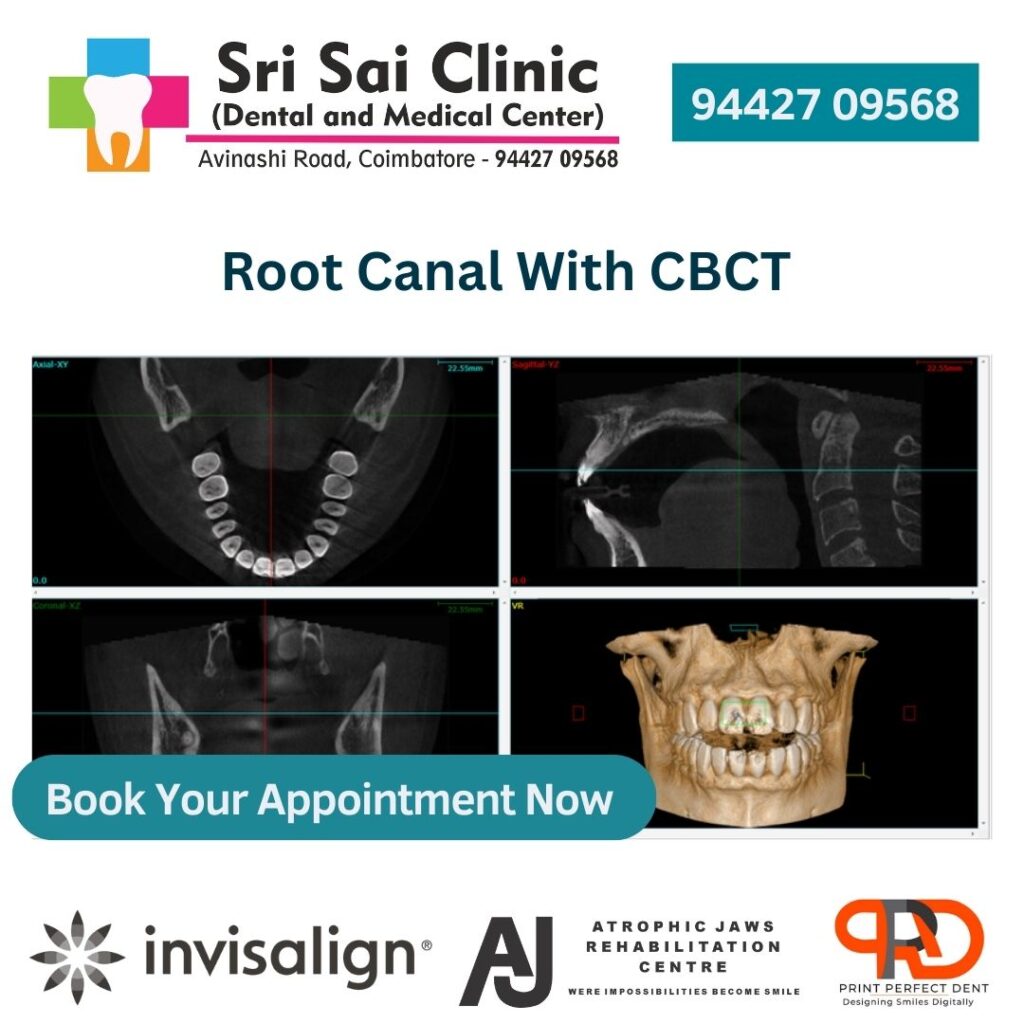Introduction
Root canal treatments have come a long way—from feared, painful procedures to safe, effective, and precise dental interventions. One of the key advancements revolutionizing this process is CBCT (Cone Beam Computed Tomography), which offers 3D imaging of your teeth and jaw, enabling dentists to diagnose and treat root canal problems with unparalleled accuracy.
At Sri Sai Dental Clinic in Coimbatore, this blend of technology and expert care ensures that patients receive top-tier root canal therapy with minimal discomfort and maximum success.
What is Root Canal Treatment?
A Root Canal Treatment (RCT) is a procedure to save a tooth that is severely decayed or infected. Inside every tooth is a pulp chamber filled with nerves and blood vessels. When this pulp becomes inflamed or infected due to deep cavities, trauma, or cracks, it can cause severe pain and sensitivity.
Common Symptoms Indicating RCT:
- Persistent toothache
- Swelling or pus discharge from the gums
- Sensitivity to hot or cold foods
- Discoloration of the tooth
- Pain while chewing
What is CBCT?
CBCT stands for Cone Beam Computed Tomography. Unlike regular dental X-rays, CBCT provides a 3D image of your teeth, bone, and surrounding structures. It helps dentists see the tooth from every angle, identifying things that 2D images can easily miss.
How It Works:
- A CBCT scanner rotates around your head.
- It captures hundreds of images in seconds.
- A computer compiles these into a full 3D model of the affected area.
Why Use CBCT in Root Canal Treatment?
Precision is key in root canal therapy. Even the slightest oversight—like a missed canal or hidden infection—can cause treatment failure. That’s where CBCT steps in.
Advantages:
- Visualize all root canals, even extra or curved ones
- Detect fractures or abnormalities early
- Prevent complications by identifying anatomical variations
CBCT’s Role in Diagnosing Complex Root Issues
Some teeth, especially molars, can have curved, narrow, or multiple canals. These are easy to miss with 2D X-rays.
With CBCT, Dentists Can:
- Detect vertical root fractures
- Map internal tooth anatomy accurately
- Locate canals that are invisible in standard X-rays

Steps in a CBCT-Guided Root Canal Procedure
- Consultation & Clinical Exam: Pain assessment and initial X-rays
- CBCT Imaging: 3D scan of the tooth to assess root structure
- Access & Cleaning: Removal of infected pulp using tiny instruments
- Shaping & Disinfection: Canals are shaped and cleaned with irrigation
- Filling & Sealing: Canals are filled with gutta-percha and sealed
- Crown Placement (if needed): Restores the tooth’s strength and function
Benefits of Combining CBCT with RCT
- ✔️ Higher Treatment Accuracy
- ✔️ Reduced Risk of Missed Canals or Infection
- ✔️ Better Long-Term Outcomes
- ✔️ Shorter Procedure Time
- ✔️ Fewer Follow-Up Visits Needed
Who Needs CBCT in Root Canal Cases?
CBCT isn’t necessary for every root canal but is strongly recommended in these situations:
- Second-time RCT (retreatment)
- Molar teeth with complex anatomy
- Cracked teeth or those with unexplained symptoms
- Unclear X-ray results
CBCT in Re-RCT (Retreatment of Failed Root Canals)
When a previous root canal fails due to missed canals, infections, or fractures, CBCT can reveal the issue in 3D.
It can also assist in planning apicoectomy (root-end surgery) when retreatment is not an option.
Root Canal with CBCT at Sri Sai Dental Clinic, Coimbatore
Sri Sai Dental Clinic is among the few clinics in Coimbatore that offer in-house CBCT scanning for precise endodontic treatments.
Why Choose Them?
- Led by Dr. P. Vidhiyasagar (MDS) and Dr. R. Suganya (BDS)
- Specialized in advanced root canal procedures
- Use of digital scanning and high-tech sterilization
- Known for pain-free dental care and high patient satisfaction
- Located at No. 2, Vetrivel Nagar, Avinashi Road, Coimbatore
- Book appointments via srisaidentalclinic.com
Is CBCT Safe for RCT Patients?
Yes, CBCT is safe and involves low radiation exposure, significantly less than medical CT scans. It’s used selectively and only when necessary, following all radiation safety protocols.
Cost of Root Canal with CBCT
- Root Canal Treatment: ₹3,000–₹7,000 depending on the tooth and complexity
- CBCT Scan: ₹2,500–₹5,000 (one-time scan cost)
- Crown Placement (if needed): ₹3,000–₹8,000 depending on material
Most clinics offer EMI options and insurance coverage for RCT (partially or fully).
Common Myths About Root Canal and CBCT
🚫 Myth: Root canals are painful
✅ Fact: With modern anesthesia and CBCT-guided precision, it’s almost painless.
🚫 Myth: CBCT is unnecessary
✅ Fact: CBCT helps prevent failures and improves outcomes.
🚫 Myth: Root canal weakens the tooth
✅ Fact: Once crowned, the tooth functions like normal.
Post-Treatment Care and Tips
- Avoid chewing on the treated side for a few days
- Take prescribed medications
- Maintain oral hygiene
- Get a crown if advised to protect the tooth
- Attend follow-up visits
Conclusion
CBCT technology has transformed root canal therapy into a more accurate, effective, and comfortable experience. When paired with expert care at Sri Sai Dental Clinic, it ensures the best possible outcomes for even the most complex dental cases.
If you’re in Coimbatore and need a root canal, choose a clinic that offers CBCT-guided treatments—you’ll smile brighter and worry less.
FAQs
- Does every root canal require CBCT?
No, only complex cases or re-treatments usually need CBCT. - Is CBCT painful?
Not at all. It’s a quick and painless scan done in less than a minute. - How long does the scan and treatment take?
CBCT scan takes about 30 seconds. Root canal treatment may take 1-2 sessions. - Can CBCT be done on children?
Yes, but only if absolutely necessary, with safety precautions in place. - Is CBCT included in insurance?
Some dental insurance plans may cover the scan partially; check with your provider.